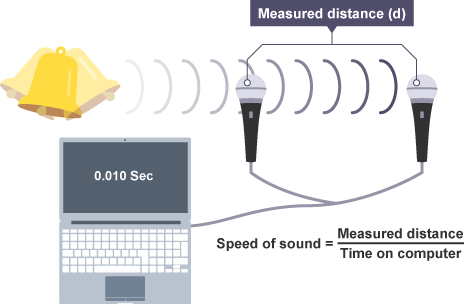Class 7 Exam > Class 7 Notes > Year 7 Physics (Cambridge) > Echoes
Echoes | Year 7 Physics (Cambridge) - Class 7 PDF Download
Reflection of Sound
- Definition: Reflection of sound waves is known as an echo.
- Example: When sound waves hit a wall, some are absorbed and some reflect back, creating an echo.
- Impact of Environment: Empty rooms amplify echoes; soft furnishings like carpets reduce echo effects.
Using Echoes to Measure Speed of Sound
- Equation: Speed of sound (v) = Distance (d) / Time (t)
- Example Calculation:
- If echo heard in 2 seconds, and distance to wall is 340 meters, total distance traveled = 680 meters.
- Calculation:

- Calculating Distance Using Echoes: Distance (d) = Speed (v) × Time (t)

Ultrasound
- Definition: Sound waves above 20,000 Hz, beyond human hearing range.
- Animal Use: Bats use echolocation (emitting and detecting ultrasound echoes) for navigation and hunting.
- Medical Use: Ultrasound imaging in medicine uses echoes to visualize internal organs, such as imaging a baby in the womb.
- Marine Use: Ships use sonar (ultrasound echoes) for underwater navigation, calculating distances to objects like the seabed.
Question for EchoesTry yourself: What is the term used to describe sound waves above 20,000 Hz?View Solution
Conclusion
Understanding echoes and ultrasound is crucial in various fields, from animal navigation to medical diagnostics and maritime navigation.
The document Echoes | Year 7 Physics (Cambridge) - Class 7 is a part of the Class 7 Course Year 7 Physics (Cambridge).
All you need of Class 7 at this link: Class 7
|
14 videos|31 docs|9 tests
|
FAQs on Echoes - Year 7 Physics (Cambridge) - Class 7
| 1. What are the eligibility criteria for the UK Schools Exam? |  |
Ans. To be eligible for the UK Schools Exam, students must be currently enrolled in a school in the UK and meet any additional requirements set by the exam board.
| 2. How can students register for the UK Schools Exam? |  |
Ans. Students can register for the UK Schools Exam through their school's exam coordinator or directly with the exam board. Registration deadlines and procedures may vary.
| 3. What is the format of the UK Schools Exam? |  |
Ans. The UK Schools Exam typically consists of multiple-choice questions, short answer questions, and possibly an essay or extended response section. The exam duration and structure may vary depending on the subject.
| 4. How can students prepare for the UK Schools Exam effectively? |  |
Ans. Students can prepare for the UK Schools Exam by reviewing past papers, studying the relevant course material, and seeking help from teachers or tutors if needed. Creating a study schedule and practicing time management can also be beneficial.
| 5. Are there any specific study resources recommended for the UK Schools Exam? |  |
Ans. While specific study resources may vary depending on the subject, students can benefit from using textbooks, revision guides, online resources, and study groups to prepare for the UK Schools Exam effectively.
Related Searches





















